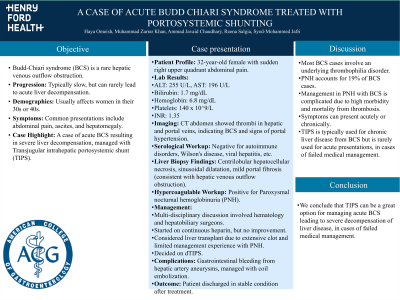Tuesday Poster Session
Category: Liver
P4708 - A Case of Acute Budd Chiari Syndrome Treated With Portosystemic Shunting
Tuesday, October 29, 2024
10:30 AM - 4:00 PM ET
Location: Exhibit Hall E

Has Audio
- HO
Haya Omeish, MD
Henry Ford Health
Detroit, MI
Presenting Author(s)
Haya Omeish, MD1, Muhammad Zarrar Khan, MD2, Ammad Javaid. Chaudhary, MD1, Reena Salgia, MD1, Syed-Mohammed Jafri, MD1
1Henry Ford Health, Detroit, MI; 2Henry Ford Hospital, Royal Oak, MI
Introduction: Budd-Chiari syndrome (BCS) is a rare condition involving hepatic venous outflow obstruction. While it typically progresses slowly, it can cause facute decompensation of liver disease creating significant management challenges. Here we present a case of acute BCS leading to severe decompensation of liver disease managed by Transjugular intrahepatic portosystemic shunt (TIPS).
Case Description/Methods: A 32-year-old female with a history of iron deficiency anemia, presented with sudden right upper quadrant abdominal pain. Labs showed ALT of 255 U/L and AST 196 U/L, bilirubin 1.7 mg/dL, hemoglobin 6.8 mg/dL, platelets 140 x 10^9/L, and INR 1.35. CT abdomen revealed thrombi in the hepatic and portal veins, suggestive of BCS, and signs of portal hypertension. Serological workup including autoimmune, wilson's disease, viral hepatitis, etc, were negative. Liver biopsy showed centrilobular hepatocellular necrosis, sinusoidal dilatation, and mild portal fibrosis consistent with hepatic venous outflow obstruction. Hypercoagulable workup revealed Paraoxysmal nocturnal hemoglobinuria. Multi-disciplinary discussion with hematology and hepatobiliary surgeons was ensued and the patient was started on continuous heparin. Despite anticoagulation therapy, the patient’s condition did not improve, leading to consideration for liver transplant. Due to extent of the clot, limited experience with management of PNH, and the patient’s hesitance, dTIPS was performed. Her proceeding hospital course was complicated by gastrointestinal bleeding from hepatic artery aneurysms, managed with coil embolization. Otherwise she did well and was discharged in stable condition.
Discussion: BCS, a rare hepatic venous outflow obstruction disorder, predominantly affects women in their third or fourth decade, presenting with abdominal pain, ascites, and hepatomegaly. Most cases of BCS entail an underlying thrombophilia disorder, with PNH contributing to 19% of cases. In PNH patients, management is often complicated as morbidity and mortality with thrombosis is high. In recent times Eculizumab has proven to mitigate thromboembolism risk. Symptoms onset can range from acute presentation, such as our case, to chronic TIPS typically has been used to manage chronic decompensation of liver disease caused by BCS but has seldom been used as a rescue therapy for sequealae of portal hypertension, such as in our case. Therefore, multidisciplinary decision-making is important when encountering rare causes and presentation of BCS.
Disclosures:
Haya Omeish, MD1, Muhammad Zarrar Khan, MD2, Ammad Javaid. Chaudhary, MD1, Reena Salgia, MD1, Syed-Mohammed Jafri, MD1. P4708 - A Case of Acute Budd Chiari Syndrome Treated With Portosystemic Shunting, ACG 2024 Annual Scientific Meeting Abstracts. Philadelphia, PA: American College of Gastroenterology.
1Henry Ford Health, Detroit, MI; 2Henry Ford Hospital, Royal Oak, MI
Introduction: Budd-Chiari syndrome (BCS) is a rare condition involving hepatic venous outflow obstruction. While it typically progresses slowly, it can cause facute decompensation of liver disease creating significant management challenges. Here we present a case of acute BCS leading to severe decompensation of liver disease managed by Transjugular intrahepatic portosystemic shunt (TIPS).
Case Description/Methods: A 32-year-old female with a history of iron deficiency anemia, presented with sudden right upper quadrant abdominal pain. Labs showed ALT of 255 U/L and AST 196 U/L, bilirubin 1.7 mg/dL, hemoglobin 6.8 mg/dL, platelets 140 x 10^9/L, and INR 1.35. CT abdomen revealed thrombi in the hepatic and portal veins, suggestive of BCS, and signs of portal hypertension. Serological workup including autoimmune, wilson's disease, viral hepatitis, etc, were negative. Liver biopsy showed centrilobular hepatocellular necrosis, sinusoidal dilatation, and mild portal fibrosis consistent with hepatic venous outflow obstruction. Hypercoagulable workup revealed Paraoxysmal nocturnal hemoglobinuria. Multi-disciplinary discussion with hematology and hepatobiliary surgeons was ensued and the patient was started on continuous heparin. Despite anticoagulation therapy, the patient’s condition did not improve, leading to consideration for liver transplant. Due to extent of the clot, limited experience with management of PNH, and the patient’s hesitance, dTIPS was performed. Her proceeding hospital course was complicated by gastrointestinal bleeding from hepatic artery aneurysms, managed with coil embolization. Otherwise she did well and was discharged in stable condition.
Discussion: BCS, a rare hepatic venous outflow obstruction disorder, predominantly affects women in their third or fourth decade, presenting with abdominal pain, ascites, and hepatomegaly. Most cases of BCS entail an underlying thrombophilia disorder, with PNH contributing to 19% of cases. In PNH patients, management is often complicated as morbidity and mortality with thrombosis is high. In recent times Eculizumab has proven to mitigate thromboembolism risk. Symptoms onset can range from acute presentation, such as our case, to chronic TIPS typically has been used to manage chronic decompensation of liver disease caused by BCS but has seldom been used as a rescue therapy for sequealae of portal hypertension, such as in our case. Therefore, multidisciplinary decision-making is important when encountering rare causes and presentation of BCS.
Disclosures:
Haya Omeish indicated no relevant financial relationships.
Muhammad Zarrar Khan indicated no relevant financial relationships.
Ammad Chaudhary indicated no relevant financial relationships.
Reena Salgia indicated no relevant financial relationships.
Syed-Mohammed Jafri: Gilead, Takeda, Abbvie, Intercept, VectivBio – Advisor or Review Panel Member, Speakers Bureau.
Haya Omeish, MD1, Muhammad Zarrar Khan, MD2, Ammad Javaid. Chaudhary, MD1, Reena Salgia, MD1, Syed-Mohammed Jafri, MD1. P4708 - A Case of Acute Budd Chiari Syndrome Treated With Portosystemic Shunting, ACG 2024 Annual Scientific Meeting Abstracts. Philadelphia, PA: American College of Gastroenterology.
